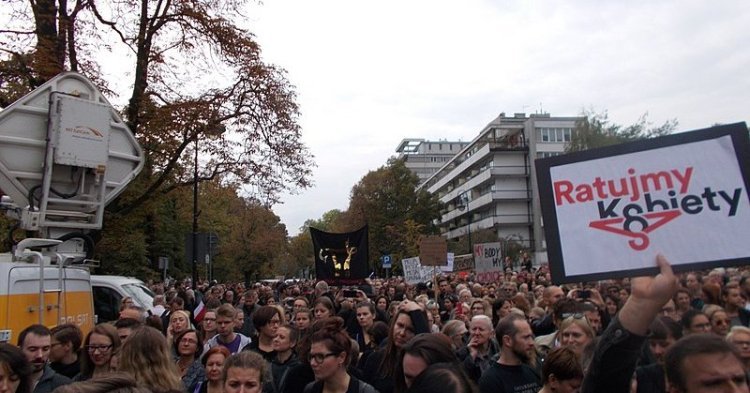Poland and the World
Last Thursday, the Polish Constitutional Tribunal ruled that abortion justified by fetal impairment is unconstitutional. It essentially outlawed the main avenue for obtaining abortions in Poland, since 98% of the procedures use this clause. Up to now, Polish law allowed abortions in three cases: risk to the woman’s life or her health; if pregnancy is a result of a criminal act; or fetal impairment. This already put Poland among the strictest countries in the EU and made it comparable to Brazil, Namibia, Venezuela, Ethiopia and Chile just to name a few. The new restrictions mean that Poland now “upgraded” its position to that of Argentina, Mali, Sudan, the majority of Mexico, Kenya and many others. This comparison is not an attempt to portray Poland as becoming “less civilised”, or “sinking to the level” of less developed countries compared to a supposedly superior Europe - this would be a misguided post-colonial view. Instead, it should be used as an indicator of Polish democracy, freedom and equality.
In some respects the ruling of the Constitutional Tribunal is not surprising, since in 2016, 2017 and 2018 there were multiple legislative attempts to limit, or completely ban abortion. However, all were scrapped due to protests, and immense public pressure.
Poland likes to argue that it is a stable democracy, with rule of law, low rates of corruption and a good education system. What is definite is that none of the countries for which the majority of the attributes can be assigned have such strict abortion laws as Poland. All in all this list is only an indicator of where Poland can be situated on the global stage in terms of upholding democratic values.
Morality and decision-making
Whether or not to go ahead with an abortion could be among the hardest decisions a woman has to make in her entire lifetime. When a couple learns that their child may have a high probability of being born with a severe and irreversible impairment or an incurable life-threatening disease, they should have the full range of options to make the most informed decision. The burden of such a decision should not fall on the state, but be based on advice from medical professionals, with the couple and most importantly the woman having a right to decide.
The issue at hand is thus not about to what extent abortion should be legal upon request and it is not about finding the deadline after which the procedure should not be allowed, as is often the core of the debate in western Europe. The question is much more basic: should Poland allow abortion in some of the most physically and psychically painful cases for the child and parents? These are examples where doctors know that the baby will die shortly after its birth, or that its survival is questionable due to lack of basic organs, bones or severe mental deficiencies.
It seems the members of the Sejm who started the lawsuit which resulted in the current decision lack the humanity to recognise the implications. I do not wish for anyone to be in such a position to be forced to decide whether to abort a baby just to save it from a short and painful life, and by involving itself in such decisions, the state is inevitably causing pain, for the parents, the family, the doctors and the baby. What for? Just to make a political and religious point.
Some statistics
So far, on average only 1,000-2,000 legal procedures were performed throughout the country every year. Furthermore, it is estimated that between 80,000 and 200,000 illegal abortions are preformed each year, 10-15% of which happen abroad in Germany or the Czech Republic and are dubbed as “Polish Abortion Tourism”. What is probably the most infuriating for the pro-choice movement is that, since 2015, there were multiple attempts to introduce these strict laws, but all were stopped by a stiff grassroots protests movement, the symbol of which became the “black protest” from 2017.
Although polls from 2014 showed a sizeable opposition to abortion, since 55% of respondents opposed the right to abortion on request, polls from 2019 show a seachange with 58% of Poles supporting abortions until the 12th week of pregnancy.
Furthermore, the status quo, i.e. allowing abortion in cases of sever fetal impairment is supported by 78% of the population according to a 2018 poll. In consequence it seems that the government may have overplayed its hand, and it is safe to assume that their motivations are not guided by public opinion but rather its own ideology.
What now?
International criticism is expected to follow, but it will probably have little effect in legal terms. So far the EU has not responded through its official channels, but such a move would certainly show its commitments to basic human rights. What will happen next is not clear. Certainly, the same domestic movement that kept this law from passing will be mobilised again, but under the current circumstances it may become more radicalised. What complicates the issue even further is the fact that the government announced that from Saturday, a countrywide lockdown is in effect. It is true that coronavirus cases are exponentially growing (currently around 13,000 cases a day). However, it is entirely plausible that the introduction of lockdown was partly a political decision aimed at preventing widespread protests. Still, the police have already detained several members of the public and issued fines, in connection to the Thursday protests.
Currently, there is a debate whether deeming the protests illegal was actually a constitutionally valid decision, since no law passed by the Sejm restricting the right to assemble can override the constitutional assurance to do just that. This is important since the police used exactly this justification for its use of force. But as we have seen in this and other cases, the rule of law is no longer a priority in Poland. Consequently, since neither the protesters, nor the government, is showing signs of backing down, we must expect a further escalation of the crisis.


Follow the comments: |
|
